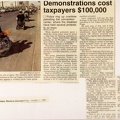[Headline] Protesters stick Metro with expense
Bob Shemeligian LAS VEGAS SUN
[Image] PHOTO by Benjamin Rusnak/Special to the Sun: A line of protesters span a broad street with palm trees on one side and large white buildings on the other. You can see signs for the Sahara and Cesar's Palace. The protesters, mostly in wheelchairs, have their fists raised and two have posters that read "Don't make me leave my home" and "my life is not for sale." Wynelle Carson, Kirstin ___ and Laura ____ are the three women on the right side of the line. Behind the protesters you can see a cluster of police officers.
Two other PHOTOS by Benjamin Rusnak/Special to the Sun: One is the head of a man [AHCA's Willging] and the other is of the back of a manual wheelchair with a pink poster taped on it that reads "Are You Next?" Down the street a little from the wheelchair is a large group of police officers walking toward the wheelchair.
Caption reads: Dr. Paul Willging, left, -executive vice president of AHCA, speaks Wednesday. Metro officers arrest ADAPT protesters while the sign on Billy "the Kid" Montalbo's [sic, should be Montalvo] wheelchair asks who will be next to have to move into a nursing home. Ironically, Montalbo [sic] was next to be arrested.
One hundred thousand dollars.
That's what Metro Police Lt. Fruge estimates it will the taxpayers for police officers to curtail illegal actions of disabled demonstrators who were protesting this week against nursing homes.
At the latest protest Wednesday afternoon, nearly 300 members of American Disabled Attendant Program Today, in wheelchairs, blocked Paradise Road at Riviera Boulevard for three hours.
The demonstrators staged protest in front of the Las Vegas Hilton, where more than 4,000 representatives of American Health Care Association, a nursing home group, are staying this week.
The association, which represents 11,000 nursing homes and rehabilitation centers, is conducting its annual convention at the Las Vegas Convention Center.
[Article continues] Metro officers arrested 108 demonstrators and transported them to a temporary detention center for processing. They were charged with unlawful assembly, a misdemeanor. In addition, 72 demonstrators were cited at the scene.
Fruge estimated that over- [text cuts off] -strations and to charter six vehicles with wheelchair lifts to transport demonstrators who have been placed under arrest will top $100,000.
"We try to be as fiscally responsible as possible, but we're in a Catch-22," Fruge said. "We cannot strip the field of demonstrations and be able to respond to emergency and trouble calls every day of the week, every hour of the day."
Fruge said the department doesn't have contingency funds to cover the costs of policing the demonstrations. Questions about funding, he said, are "going to have to be decided by the city, county and the Metro Police Fiscal Affairs Committee."
Police officials were happy about one thing Wednesday: There were no reported injuries or violent incidents at the protest.
"I know we left a wake of frustrated motorists in our path, but what else could we have done?" Fruge asked.
A few Metro officers suffered bruised shins during protests Tuesday. Some law officers, including federal ones, have said ADAPT members sharpen parts of their wheelchairs to inflict injuries.
But Carolyn Long, ADAPT's Dallas organizer, said the group subscribes to nonviolent protest and that members do not sharpen parts of their wheelchairs. She said members do not intentionally throw themselves from their chairs.
At the Las Vegas Hilton, ADAPT members taped to poles several signs stating "Fort Hilton."
"We've renamed the hotel 'Fort Hilton,' " said Mike Auberger, founder of the Denver-based disabled rights group. "This is an appropriate place to hold our protest. AHCA can't travel through, and it's no different than the plight of a disabled person who is confined to a nursing home."
Quinn Brisben, an ADAPT member from Chicago, said he walks with difficulty every day, and so he decided to help make it more difficult for AHCA members to walk on the day of the protest.
"They make it inconvenient for us and we're making it inconvenient for them," he said.
Brisben also has a bone to pick with the Las Vegas community "Las Vegas has absolutely no public benches, which afford people who walk with difficulty, as I do, a place to rest."
ADAPT wants Congress to redirect 25 percent of $23 billion in nursing home funds to home care for the disabled.
Sam Ackerman, a Chicago resident who volunteers his time to attend to the needs of disabled people in wheelchairs, said the issue behind the protest is dignity.
"For me, this is part of the human rights struggle across the planet," Ackerman said.
Diana Webster of Austin, Texas, asked, "I don't understand why AHCA doesn't let people with disabilities live in their own homes."
Standing in front of the Hilton watching the protest was Paul Willging, AHCA executive vice president.
Willging said AHCA does not prevent disabled people from living at home.
Regarding the ADAPT charge that many disabled people across the nation are being cared for in nursing homes against their will. Willging said: "We would call that statement a lie. Federal and state laws are fairly explicit. You can't hold a person in a nursing home against his will."
Winging said AHCA has been trying to negotiate with ADAPT to prevent the demonstrations, but the negotiations broke down Monday when ADAPT officials refused to budge on their demand that AHCA support a resolution calling for the redirection of 25 percent of nursing home funds to home care.
"I think the leaders of ADAPT are doing a disservice to the disabled," Winging said. "Instead of being here, pushing a cause that's not achievable, we could be together in Congress lobbying for adequate funds to support long-term care (at home and in nursing homes)."
But Auberger, as he was being arrested, shouted that Willging is being unrealistic when he talks about lobbying Congress: for more money for long-tern care.
And Cassie James, a 38-year old ADAPT member who is forced to straddle a wheelchair facing downward because of scoliosis, said she understands why AHCA doesn't want to support ADAPT's resolution to voluntarily give up 25 percent of nursing home funds.
[Headline] Groups agree on problem, not solution
By Bob Shemeligian
LAS VEGAS SUN
Ironically, the American Health Care Association and the disabled rights group demonstrating at the AHCA convention here say they support the same thing: more funding for home care for the disabled.
But it is the means to achieve this goal that AHCA and American Disabled for Attendant Programs Today do not agree on. ADAPT wants Congress to redirect 25 percent of $23 billion in nursing home funds to home care for the disabled.
Activists argue that more than 1.6 million disabled Americans are being cared for in nursing homes against their will, and that this shift in funding is more practical and more humane.
But officials of AHCA, a trade organization representing nursing homes and rehabilitation centers, argue that most nursing homes don't have enough money as it is to make ends meet.
"We believe it's wrong to take money from one needy group and give it to another," Dave Kyllo, spokesman for AHCA, said this week. "We believe the resources are available to take care of the needs of the elderly and the disabled."
Kyllo and Paul Winging, AHCA executive vice president, said AHCA supports national health-care reform, and so should members of ADAPT.
But ADAPT members charge it's unrealistic to expect Congress to come up with more money for long-term health care.
"We know and they (AHCA) know that new tax dollars to support health care is not going to happen," said Mike Auberger ADAPT national organizer.
Auberger also said the profit margin it the majority of nursing homes in the nation increased by at least 10 percent from 1994 to 1993.
ADAPT members say it's more cost-efficient and more dignified to care foi the disabled in their homes.
They point out that trained attendants rather than more expensive nurses, car assist the disabled with many of the thing those who are not handicapped take foi granted.
"If we stay at home, and receive visit: from attendants, they help us with feeding dressing and toilet," said Bob Kafka, as ADAPT member who lives in Houston.
VOL 45 / NO. 109
LAS VEGAS SUN
P.M. STREET
THURSDAY, OCTOBER 6, 1994 / 50 CENTS
- Izveidots
- Otrdiena 16 Jūlijs 2013
- Ievietots
- Piektdiena 13 Septembris 2019
- Albūmi
- Apmeklējumi
- 200
- Rezultējošais vērtējums
- nav vērtējuma
- Vērtēt šo foto


0 komentāri